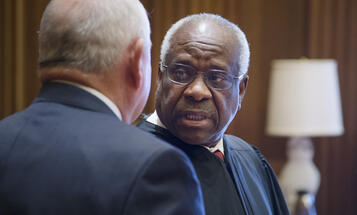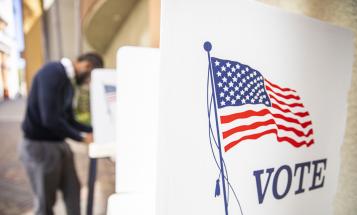
President Trump Will Violate the Constitution on Day One
Trump’s far-flung financial holdings and penchant for mixing official U.S. diplomacy with his private business affairs raise unprecedented concerns.
Trump’s far-flung financial holdings and penchant for mixing official U.S. diplomacy with his private business affairs raise unprecedented concerns about divided loyalties, shaded judgment, foreign influence, and profiteering off of American power—concerns that threaten both the integrity of our Republic and our global leadership.
A full accounting of Mr. Trump’s actual and potential conflicts is impossible because he has refused to release his tax returns and uses what the Wall Street Journal described as a “web of LLCs” to obscure his business interests, but a few egregious examples highlight the severity of the problem:
- Mr. Trump’s businesses operate in at least 20 countries, providing both foreign leaders and business partners with opportunities to unduly influence U.S. policy. He has already interrupted transition work to discuss projects with Indian business partners.
- Foreign diplomats have already talked openly about patronizing Mr. Trump’s Washington, D.C. hotel as way to curry favor with the President-Elect and the Embassy of Kuwait reportedly moved a major event to the hotel “citing pressure from members of the Trump Organization.”
- When Mr. Trump takes office he will be both the landlord and lessee of that same hotel.
- A bank owned by the Chinese government is the largest tenant in Trump Tower, and its lease will come due for renegotiation during his term as President.
These concerns were anticipated by the Founders and addressed in the U.S. Constitution. Article I explicitly prohibits the President and other government officials from accepting any gifts or payments from foreign powers. And, Article II prohibits the same from federal or state governments. Failure to adhere to these clauses, or serving as President while encumbered by clear conflicts of interest can constitute “high crimes and misdemeanors” subject to impeachment.
And, his apparent desire to retain ownership stakes in his many businesses with far-flung operations across the globe puts Mr. Trump on a crash course with the U.S. Constitution. According to Obama’s lead ethics lawyer Normal Eisen, President Bush’s lead ethics lawyer Richard Painter, and Harvard Law professor Laurence Tribe, when President-Elect Trump takes the oath on January 20th, he will enter office as “a walking, talking violation of the Emoluments Clause of the Constitution.”
In an essential paper released December 16th, these experts explain this little-known clause and it’s application to President-Elect Trump:
Wholly apart from any actual quid pro quo arrangements or demonstrable bribes or payoffs, the Emoluments Clause will be violated whenever a foreign diplomat stays in a Trump hotel or hosts a reception in one; whenever foreign-owned banks offer loans to Mr. Trump’s businesses or pay rent for office space in his buildings; whenever projects are jump-started or expedited or licensed or otherwise advantaged because Mr. Trump is associated with them; whenever foreign prosecutors and regulators treat a Trump entity favorably; and whenever the Trump Organization makes a profit on a business transaction with any foreign state or foreign-owned entity.
Mr. Trump can avoid serious conflicts and constitutional violations only by selling his businesses and placing his assets in a true blind trust, where he doesn’t know how his decisions as President could affect his financial holdings.
He promised the American people that he would tell us how he would resolve his myriad conflicts on December 15, 2016. Instead, Trump pushed back his address until sometime in 2017—notably after the Electoral College officially designated him as the next president. Three weeks after his initial tweet promising a solution there is still no plan.
What can be done to stop Trump from thumbing his nose at the Constitution?
Eisen, Painter, and Tribe point to three possible ways to fix this problem. The first remedy was recently lost—Electors could have declined to elevate Trump to the presidency on December 19th.
Second, Congress “would have a plainly valid basis under the Constitution for concluding he cannot serve in office” and could therefore impeach Trump.
Finally, Congress can pass legislation explicitly outlawing the conflicts. And, on December 15, Senators Warren, Cardin, Coons, Durbin, and Merkley announced plans for a bill that will require the President, Vice President, and their families to divest assets and place proceeds in a true blind trust; clarify that conflicts of interest and ethics violations are impeachable offenses; and direct recusal of appointees from matters involving the financial interests of the President.
Trump executed plenty of about-faces on the campaign trail—ignoring or reversing prior positions. It’s time for another critical change: to respect the Constitution and the American people he must sever his business ties once and for all.



